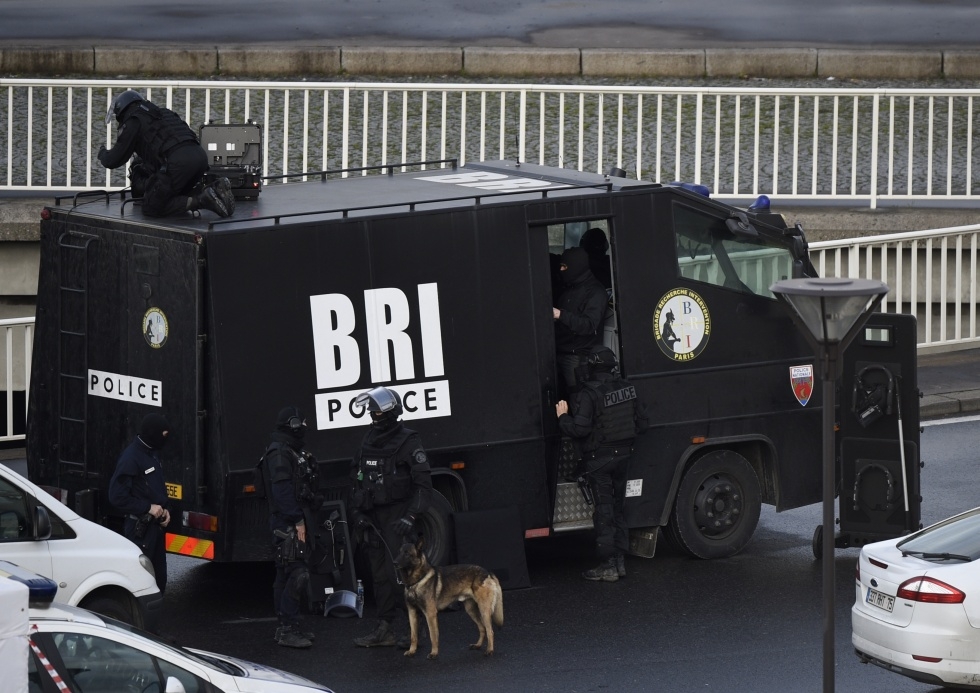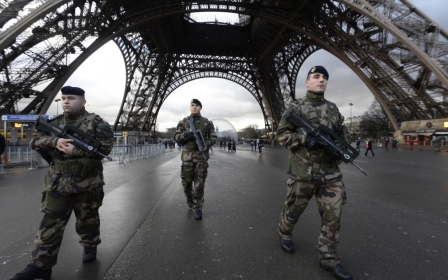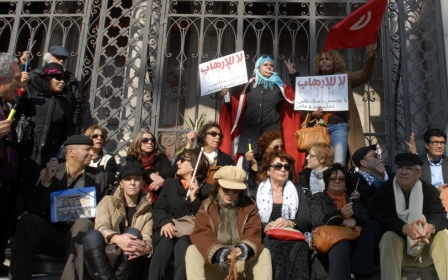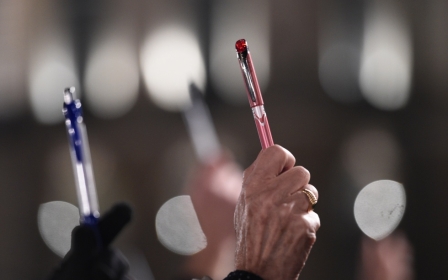French police deal with two simultaneous hostage crises

Two brothers suspected of killing 12 people in an attack in France held one person hostage on Friday as police cornered the gunmen northeast of the capital, while a third suspect has reportedly taken other hostages at a kosher grocery store in a different location.
The third gunman was suspected of being the same man who killed a policewoman in southern Paris on Thursday, who is thought to have links to the assailants who stormed satirical magazine Charlie Hebdo on Wednesday.
The hostage drama unfolded at a printing business in the small town of Dammartin-en-Goele, only 12 kilometres (seven miles) from Paris's main Charles de Gaulle airport, police sources said.
Interior Minister Bernard Cazeneuve confirmed that an operation was under way to "neutralise" the suspects as the massive manhunt appeared to be reaching a dramatic climax with helicopters buzzing overhead.
Prior to the standoff, the suspects had hijacked a Peugeot 206 nearby from a woman who said she recognised them as the brothers, Cherif and Said Kouachi, accused of killing 12 people in Wednesday's attack on the satirical weekly Charlie Hebdo, which repeatedly lampooned the Prophet Mohammed.
The attack was France's deadliest bloodbath in half a century.
Prosecutors told AFP there had been no casualties in the shoot-out.
French authorities raised the security alert to the highest possible level in the region of Picardy, to the northeast of Paris, as forces tightened their noose on the brothers, Cherif Kouachi, 32 and Said, 34.
Around 24 hours into the manhunt, the brothers were identified after holding up a petrol station 80 kilometres (50 miles) from Paris.
Helicopters buzzed overhead during the night and paramilitary forces were preparing to step up their house-to-house searches.
As heavily armed crack units swarmed through the normally tranquil countryside villages, residents voiced their nervousness.
"I don't understand: the police are dressed like Robocops in the streets, but they let us move about freely. What if we came face-to-face with them, what do we do?" asked one woman, who gave her name as Carole.
French Interior Minister Bernard Cazeneuve announced that a total of 88,000 security forces were mobilised across the country and that an international meeting on terrorism would take place in Paris on Sunday.
Nine people had already been detained as part of the operation, Cazeneuve said.
And in an uneasy French capital, isolated incidents on Thursday ratcheted the tension higher, and the shooter of a policewoman, apparently unrelated to the Charlie Hebdo attacks, was still on the run.
Hollande convened key ministers for a third emergency meeting at the Elysee Palace.
On US watch list 'for years'
Arrest warrants were issued for Cherif Kouachi, 32, a known militant convicted in 2008 for involvement in a network sending fighters to Iraq, and his 34-year-old brother Said. Both were born in Paris to Algerian parents and were orphaned at an early age.
A senior US administration official told AFP that one of the two brothers was believed to have trained with Al-Qaeda in Yemen, while another source said that the pair had been on a US terror watch list "for years".
The brothers were both flagged in a US database as terror suspects, and also on the no-fly list, meaning they were barred from flying into the United States, the officials said.
Cazeneuve meanwhile said nine people had been detained as part of the operation.
Mourad Hamyd, an 18-year-old suspected of being an accomplice in the attack, handed himself in, police sources said. It was not clear what role, if any, he may have played in the attack.
Mourning and new jitters
As the dramatic chase unfolded, bells tolled across France at midday Thursday and people gathered outside the headquarters of Charlie Hebdo in pouring rain with banners reading "Je Suis Charlie" (I am Charlie).
The same sign has featured in vigils around the world, from Australia to the United States.
Several thousand people gathered later in Paris for a second night in tribute to those killed as the Eiffel Tower dimmed its lights.
Television footage showed children at a Muslim school in the northern city of Lille holding up sheets of paper emblazoned "not in my name".
Charlie Hebdo reporter Laurent Leger, who miraculously survived the bloodbath by hiding under a table, gave the first eyewitness account from inside the office.
"I saw a masked man, I saw a lot of blood, I saw half the editorial team on the ground," he told France Info radio. "I saw horror."
Meanwhile, several other incidents rocked the jittery nation including the fatal shooting of a policewoman just south of Paris.
Two Muslim places of worship were fired at, prosecutors said, although no casualties were reported.
Declaring Thursday a national day of mourning -- only the fifth in the last 50 years -- President Francois Hollande called the Charlie Hebdo attack "an act of exceptional barbarity".
The government also called for large demonstrations to show solidarity across the country on Sunday. Hollande ordered flags to fly at half-mast for three days in France.
France's main Islamic groups urged imams to condemn terrorism and join rallies against the attacks over the weekend.
Michel Houellebecq's book
Meanwhile, French author Michel Houellebecq has suspended the promotion of his new novel "Submission", a dystopian vision of France under Islamic rule, his agent said.
The book was released on Wednesday -- the same day that 12 people were killed.
Houellebecq's friend Bernard Maris, a left-wing economist, was among those killed and the author was "deeply affected by the death", his agent Francois Samuelson told AFP.
He "left Paris to get away from it all, to the snow", Houellebecq's publisher Flammarion added.
The cover of Charlie Hebdo showed a caricature of Houellebecq and included several pages dedicated to "Submission" -- which imagines a Muslim-governed France in 2022.
At once dubbed "sublime" and "irresponsible", the novel has provoked significant debate, with critics accusing Houellebecq of stirring up Islamophobia and helping the cause of France's far-right National Front.
The author is no stranger to controversy and his latest novel received blanket media coverage in France this week.
Houellebecq prompted outrage in 2001 by stating in an interview that "the most stupid religion is, let's face it, Islam".
New MEE newsletter: Jerusalem Dispatch
Sign up to get the latest insights and analysis on Israel-Palestine, alongside Turkey Unpacked and other MEE newsletters
Middle East Eye delivers independent and unrivalled coverage and analysis of the Middle East, North Africa and beyond. To learn more about republishing this content and the associated fees, please fill out this form. More about MEE can be found here.




